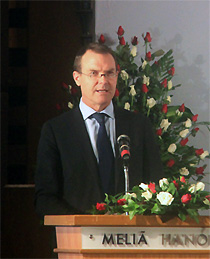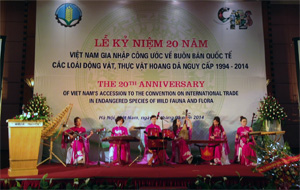Celebration of the 20th Anniversary of Viet Nam becoming a Party to CITES
Speech by John E. Scanlon, CITES Secretary-General
Ha Noi, Viet Nam, 27 May 2014
Deputy Minister of Agriculture and Rural Development, Vu Van Tam
Secretary-General of the ASEAN Inter Parliamentary Assembly, Periowsamy Otharam
Your Excellences
Distinguished delegates
Ladies and gentlemen
It is a great honour to be with you in Ha Noi today to celebrate this special occasion and I extend my deep gratitude to the Government of Viet Nam for the kind invitation and its warm hospitality.
------------------
 CITES belongs to the first wave of global environmental treaties, being adopted in Washington D.C. in 1973, and it was the first one to have entered into force in July 1975.
CITES belongs to the first wave of global environmental treaties, being adopted in Washington D.C. in 1973, and it was the first one to have entered into force in July 1975.Viet Nam joined CITES in 1994 and it was the 121st Party to the Convention, which today has 180 States Parties.
While it is now 41 years old, CITES is needed more than ever today – and Heads of State and governments at Rio+20, held in June 2012, recognized (in the outcome document, The Future We Want), the important role of CITES as an international agreement that stands at the intersection between trade, the environment and development.
CITES has proven to be a unique and effective treaty, one that has evolved over time to meet emerging challenges. Its success is largely due to its operational and pragmatic approach, which blends international cooperation with ‘on-the-ground’ implementation and enforcement through national management, scientific and enforcement authorities.
In this connection, I would like to congratulate and thank the Vietnamese CITES authorities for all of their good work over the past 20 years, such as in the fields of national legislation and policy reviews – with Viet Nam’s legislation being in Category 1 (meaning it fully meets CITES requirements) and Viet Nam being amongst the first countries to initiate and complete a Wildlife Trade Policy Review.
It is however obvious from today's state of the environment and the scale and nature of illegal wildlife trade that we still have a lot of work to do. The dynamics of wildlife crime have changed – and so must our response – to ensure it matches the scale, nature, and immediacy of the risk that wildlife trafficking now poses to wild plants and animals, to people, to security and to economies.
The positive news is that over the past few years there has been a global awakening at all political levels and across multiple agencies to the serious threats posed by wildlife trafficking – and Viet Nam has been an important part of this collective effort.
The rapid economic development experienced by Viet Nam has created challenges to the conservation and sustainable use of natural resources, including species of wild fauna and flora. Viet Nam lost its last Javan rhino to poachers in 2011 and its elephant population has declined from about 2,000 in 1975 to less than 100 today. It is both a source and transit state for the illegal trade in Siamese rosewood and a major destination for illegally traded rhino horn.
Looking ahead, ASEAN is moving towards the realization of the ASEAN Economic Community by 2020, the implementation of the ASEAN Free Trade Area and the Single Window approach, which will present its own opportunities and challenges for regulating international trade in wildlife.
There are many and varied challenges and we note with great appreciation Viet Nam’s domestic efforts to address these challenges, in particular since the last CITES CoP in 2013.
The Prime Minister’s recent Directive to strengthen wildlife enforcement effort across all Ministries, sectors and local authorities and to stop the demand for illegally traded products – together with the development of the Action Plan to support it – represents a major milestone in CITES implementation in Viet Nam.
 Viet Nam has also expressed its intention to implement the ICCWC (International Consortium on Combatting Wildlife Crime) Wildlife and Forest Crime Analytic Toolkit and it has incorporated CITES enforcement priorities into its revised (draft) National Biodiversity Strategy and Action Plan (NBSAP), which will open up opportunities to attract GEF funding. We hope it also sets an example for other countries to follow as they revise their own NBSAPs.
Viet Nam has also expressed its intention to implement the ICCWC (International Consortium on Combatting Wildlife Crime) Wildlife and Forest Crime Analytic Toolkit and it has incorporated CITES enforcement priorities into its revised (draft) National Biodiversity Strategy and Action Plan (NBSAP), which will open up opportunities to attract GEF funding. We hope it also sets an example for other countries to follow as they revise their own NBSAPs.
Following the CITES CoP in 2013 Viet Nam prepared a detailed National Ivory Action Plan containing 21 specific actions and it has also reported on multiple actions taken in response to decisions that were directed to it on the illegal trade in rhino horn, all of which will be reported to, and reviewed by, the CITES Standing Committee in July.
Viet Nam also plays an increasingly active role in CITES affairs at the international level through the ASEAN Wildlife Enforcement Network, the cross continental enforcement effort known as Operation Cobra, and through its collaboration with with South Africa on combatting the poaching and smuggling of rhinos.
While much of the discussion this week is focused on illegal wildlife trade, it is important to also note that Viet Nam has taken positive steps to address the conservation and sustainable use of CITES-listed species that can be commercially traded under CITES, and in particular with seahorses and pythons.
We look forward to continuing to work very closely with the CITES authorities in Viet Nam as it further enhances its domestic efforts to combat, and suppress demand for, illegally traded wildlife - as well supporting its work with scientists and local communities to ensure that legal trade in certain CITES-listed species is sustainable.
In both cases we encourage Viet Nam to play an even more prominent role in the implementation of the Convention into the future.
-------
Distinguished delegates, it is a truly special occasion today, I am honoured to be here in Ha Noi on behalf of the whole CITES family, and I congratulate and sincerely thank you for your warm hospitality and for giving us the opportunity to share this significant milestone with you.